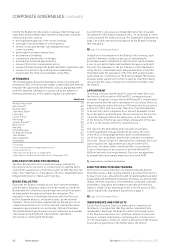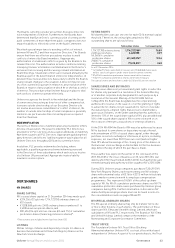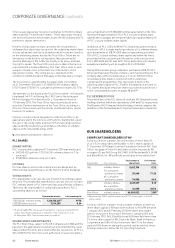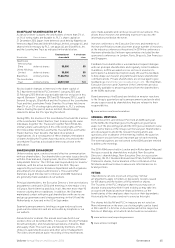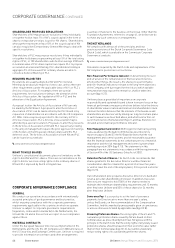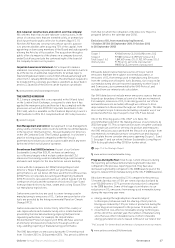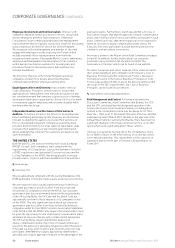Unilever 2014 Annual Report Download - page 15
Download and view the complete annual report
Please find page 15 of the 2014 Unilever annual report below. You can navigate through the pages in the report by either clicking on the pages listed below, or by using the keyword search tool below to find specific information within the annual report.
DESRIPTION OF RISK WHAT WE ARE DOIN TO MANAE THE RISK
BUSINESS TRANSFORMATION
Successful execution of business transformation proects is
key to delivering their intended business benefits and avoiding
disruption to other business activities.
Unlever s contnually engaged n maor change proects, ncludng
acqustons and dsposals and outsourcng, to drve contnuous
mprovement n our busness and to strengthen our portfolo and
capabltes
Falure to execute such transactons or change proects
successfully, or performance ssues wth thrd party outsourced
provders on whch we are dependent, could result n under-delvery
of the expected benefts Furthermore, dsrupton may be caused n
other parts of the busness
All acqustons, dsposals and global restructurng proects
are sponsored by a member of the Unlever Leadershp Executve
Regular progress updates are provded to the Unlever
Leadershp Executve
Sound proect dscplnes are used n all merger, acqustons,
restructurng and outsourcng proects and these proects are
resourced by dedcated and approprately qualfed personnel
The performance of thrd party outsourced provders s kept under
constant revew, wth potental dsrupton lmted to the tme and
cost requred to nstall alternatve provders
Unlever also montors the volume of change programmes under
way n an effort to stagger the mpact on current operatons and
to ensure mnmal dsrupton
EXTERNAL EONOMI AND POLITIAL RISKS AND
NATURAL DISASTERS
Unilever operates across the globe and is exposed to a range
of external economic and political risks and natural disasters
that may affect the execution of our strategy or the running of
our operations.
Adverse economc condtons may result n reduced consumer
demand for our products, and may affect one or more countres
wthn a regon, or may extend globally
overnment actons such as fscal stmulus, changes to taxaton
and prce controls can mpact on the growth and proftablty
of our local operatons
Socal and poltcal upheavals and natural dsasters can dsrupt
sales and operatons
In 2014, more than half of Unlever’s turnover came from emergng
markets ncludng Brazl, Inda, Indonesa, Turkey, South Afrca,
China, Mexico and Russia. These markets offer greater growth
opportunities but also expose Unilever to economic, political
and social volatility in these markets.
The breadth of Unilever’s portfolio and our geographic reach
help to mitigate our exposure to any particular localised risk
to an extent. Our flexible business model allows us to adapt
our portfolio and respond quickly to develop new offerings
that suit consumers’ and customers’ changing needs during
economic downturns.
We regularly update our forecast of business results and cash
flows and, where necessary, rebalance investment priorities.
We have continuity planning designed to deal with crisis
management in the event of political and social events and
natural disasters.
We believe that many years of exposure to emerging markets
have given us experience operating and developing our business
successfully during periods of economic, political or social change.
TREASURY AND PENSIONS
Unilever is exposed to a variety of external financial risks in
relation to Treasury and Pensions.
Changes to the relative value of currencies can fluctuate widely
andcould have a significant impact on business results. Further,
because Unilever consolidates its financial statements in euros it
issubject to exchange risks associated with the translation of the
underlying net assets and earnings of its foreign subsidiaries.
We are also subject to the imposition of exchange controls by
individual countries which could limit our ability to import materials
paid in foreign currency or to remit dividends to the parent company.
Currency rates, along with demand cycles, can also result in
significant swings in the prices of the raw materials needed
to produce our goods.
Unilever may face liquidity risk, ie difficulty in meeting its obligations,
associated with its financial liabilities. A material and sustained
shortfall in our cash flow could undermine Unilever’s credit rating,
impair investor confidence and also restrict Unilever’s ability to
raise funds.
Currency exposures are managed within prescribed limits and by
theuse of forward foreign exchange contracts. Further, operating
companies borrow in local currency except where inhibited by
local regulations, lack of local liquidity or local market conditions.
We also hedge some of our exposures through the use of foreign
currency borrowing or forward exchange contracts.
Our interest rate management approach aims to achieve an optimal
balance between fixed and floating rate interest exposures on
expected net debt.
We seek to manage our liquidity requirements by maintaining
accessto global debt markets through short-term and long-term
debt programmes. In addition, we have high committed credit
facilities for general corporate purposes.
Group treasury regularly monitors exposure to our banks, tightening
counter-party limits where appropriate. Unilever actively manages
its banking exposures on a daily basis.
52 Unilever Annual Report and Accounts 2014Governance
RISKS CONTINUED


